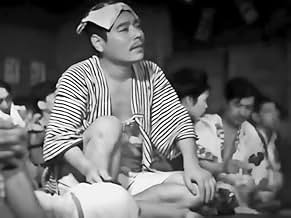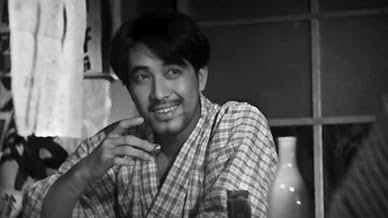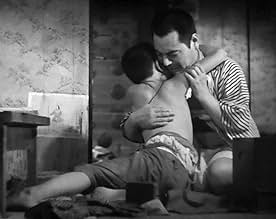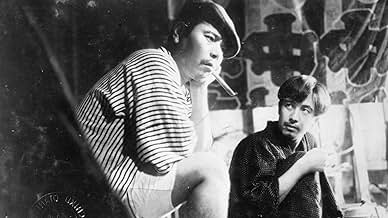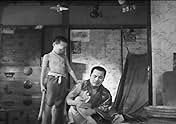Dekigokoro
- 1933
- 1 घं 40 मि
IMDb रेटिंग
7.2/10
1.5 हज़ार
आपकी रेटिंग
अपनी भाषा में प्लॉट जोड़ेंTwo Tokyo co-workers come across a destitute young lady in search of a place to live.Two Tokyo co-workers come across a destitute young lady in search of a place to live.Two Tokyo co-workers come across a destitute young lady in search of a place to live.
- पुरस्कार
- कुल 1 जीत
Den Ôhinata
- Jiro
- (as Den Obinata)
Tomio Aoki
- Tomio
- (as Tokkan Kozô)
Chishû Ryû
- Man on boat
- (बिना क्रेडिट के)
Hideo Sugawara
- Boy Taunting Tomio
- (बिना क्रेडिट के)
फ़ीचर्ड समीक्षाएं
A look at pre WWII Japan and it's family cultural values. Who would guess in 30 years they'd industrialize with the introduction of the transistor radio and great affordable cars.
"Passing fancy" (1933) is the latest of the three "silent Ozu's" that I have watched recently (the others were "Tokyo chorus" (1931) and "I was born ... but" (1932)) and the most recent one. Despite the coming of sound Ozu still adheres (just like Chaplin) firmly to the silent tradition. In his view silent film was on his way to reaching perfection and this was threatened by the still infant and imperfect sound technology. "Passing fancy" has many slapstick elements. See for example how characters in this film scratch their buttocks to express uncertainty and discomfort.
"Passing fancy" is of al three silent Ozu's the one with the most contrast to his later oeuvre.
It is about a young son and an adult father in stead of about an adult son and elderly parents. The father is single. The father is working class and not middle class.
Apart from the father-son relationsship there is also a love triangle in this film. In his favourite pub one night there appears a young lady. The father inmediately falls for her charms, but his younger colleague does not trust the lady. Of course the lady herself prefers the younger colleague. The father does ridicule himself courting someone half his age and in the proces neglects his son. Halfway the film one wonders if the father is raising his son or the other way round.
At the end the father, who is pretty good in fooling himself, has ultimately to come to two conclusions. In the first place that he is too old for the young lady (who calls him "a nice uncle", at first much to his chagrin) and in the second place that he has been a lousy father.
Takashi Sakamoto plays the somewhat naive and not very clever father in such a sympathetic way that the next year he returned as the main charecter in Ozu's real breakthrough film "A story of floating weeds".
"Passing fancy" is of al three silent Ozu's the one with the most contrast to his later oeuvre.
It is about a young son and an adult father in stead of about an adult son and elderly parents. The father is single. The father is working class and not middle class.
Apart from the father-son relationsship there is also a love triangle in this film. In his favourite pub one night there appears a young lady. The father inmediately falls for her charms, but his younger colleague does not trust the lady. Of course the lady herself prefers the younger colleague. The father does ridicule himself courting someone half his age and in the proces neglects his son. Halfway the film one wonders if the father is raising his son or the other way round.
At the end the father, who is pretty good in fooling himself, has ultimately to come to two conclusions. In the first place that he is too old for the young lady (who calls him "a nice uncle", at first much to his chagrin) and in the second place that he has been a lousy father.
Takashi Sakamoto plays the somewhat naive and not very clever father in such a sympathetic way that the next year he returned as the main charecter in Ozu's real breakthrough film "A story of floating weeds".
Ozu has often used the theme of father and son relationships in his films and here he explores a little more besides. Beyond the relationship of Kihachi the father and Tomio the young son you get the widower Kihachi trying to become closer to the pretty, much younger Harue. This silent film speaks volumes about family, about hopes but it is Ozu's light comic touch which makes it another great film of his. It is completely silent but it is compelling, actually a story that could be retold and remade in any corner of the globe. The acting is just about universally good and the film has a lot of heart attached to its sometimes ordinary theme. Then again, Ozu has always made extraordinary out of the ordinary. Here is another example of the master at work.
Another early Ozu where family ties - severely tested but affirmed - steer the world away from havoc and into good. Another early Ozu that documents Japanese society being pushed through the wringer of Western influence, cinematically reflected with Chaplinesque beats: the father is a lazy factory worker and no good man-about-town, in stark contrast to the meek, corporate executive father in I Was Born But.., and once more the stubborn son has to live with the shame.
This go round and in comparison to the above film, the intended seduction of suburban life is less effective. The innocence of childhood is less the fulcrum of discovery of how the world works, and more a counterpoint to ordinary drama; thwarted love, strained friendship, high-minded sacrifice in the end that seduces noble, better persons out of everyone.
Everything turns out the way it does for a reason, the film whimsically asserts. Why is sea water salty? But of course for us to salt salmon with.
It is good and was awarded that year with a Kinema Jumpo beating films by future rivals Mizoguchi and Naruse. I assume it won for the denouement of selfless humanity - inspirationally miraculous and accompanied by fireworks in the sky - that must have echoed desirably at tumultuous times such as those, but there were more interesting things afoot in Japanese cinema of the time.
This go round and in comparison to the above film, the intended seduction of suburban life is less effective. The innocence of childhood is less the fulcrum of discovery of how the world works, and more a counterpoint to ordinary drama; thwarted love, strained friendship, high-minded sacrifice in the end that seduces noble, better persons out of everyone.
Everything turns out the way it does for a reason, the film whimsically asserts. Why is sea water salty? But of course for us to salt salmon with.
It is good and was awarded that year with a Kinema Jumpo beating films by future rivals Mizoguchi and Naruse. I assume it won for the denouement of selfless humanity - inspirationally miraculous and accompanied by fireworks in the sky - that must have echoed desirably at tumultuous times such as those, but there were more interesting things afoot in Japanese cinema of the time.
10kerpan
Dekigokoro (Passing Fancy), is one of Ozu's 3 masterpieces from 1933. It stars the second of cinematic Ozu's "alter egos", Takeshi Sakamoto. Sakamoto typically plays a down and out working class father. Here, he is especially dense, to excellent comic effect. Tomio Aoki (in probably his most significant child role) plays a kid who seems to be considerably brighter than his father -- and who does more to keep the household running. Aoki is (of course) quite funny. But he also does an excellent job of showing a child's response to unwanted change. He and his father have long depended solely on each other -- but now his father has his eye on a young woman who has moved into their slum neighborhood. Aoki very much resents his father's interest in the woman -- and resists her attempts to win his affections.
This is an extremely visual film, with lots of completely "wordless" humor. The film starts out with an extended scene in a music hall (Chishu Ryu performing as the "singer") in which first a lost wallet circulates, and then a flea (or fleas). Probably not as great a family drama as the prior "I Was Born But" or the subsequent "Tokyo Inn", but nonetheless quite enjoyable.
This is an extremely visual film, with lots of completely "wordless" humor. The film starts out with an extended scene in a music hall (Chishu Ryu performing as the "singer") in which first a lost wallet circulates, and then a flea (or fleas). Probably not as great a family drama as the prior "I Was Born But" or the subsequent "Tokyo Inn", but nonetheless quite enjoyable.
क्या आपको पता है
- ट्रिवियाYasujirô Ozu regular Chishû Ryû has a small role towards the end of the film as a fellow passenger on board a ship, playing an uncredited "Man on Boat".
- गूफ़Kihachi states that 50 sen to a boy his age (referring to Tomio) is like 10 ryo to him and Otome. The ryo was replaced by the yen in 1871, over 60 years earlier. (The yen replaced the ryo at par; there are 100 sen to the yen.)
However, Otome then says, "No, more like 1,000 yen!" So, it's possible "ryo" was still being used synonymously with "yen" over a half-century later.
- कनेक्शनFeatured in Transcendental Style and Flatulence (2017)
टॉप पसंद
रेटिंग देने के लिए साइन-इन करें और वैयक्तिकृत सुझावों के लिए वॉचलिस्ट करें
विवरण
- रिलीज़ की तारीख़
- कंट्री ऑफ़ ओरिजिन
- भाषा
- इस रूप में भी जाना जाता है
- Passing Fancy
- उत्पादन कंपनी
- IMDbPro पर और कंपनी क्रेडिट देखें
- चलने की अवधि1 घंटा 40 मिनट
- रंग
- ध्वनि मिश्रण
- पक्ष अनुपात
- 1.37 : 1
इस पेज में योगदान दें
किसी बदलाव का सुझाव दें या अनुपलब्ध कॉन्टेंट जोड़ें


